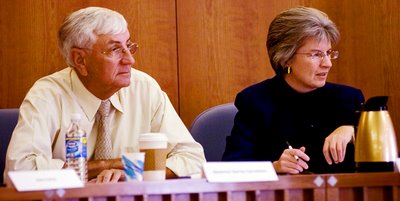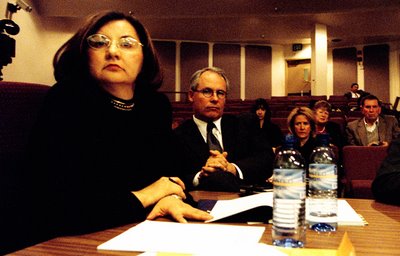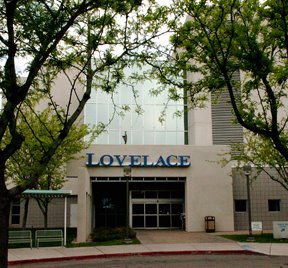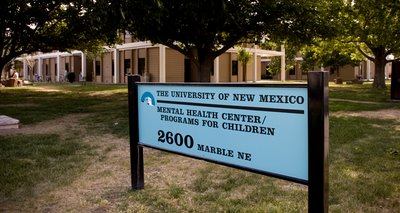
This is the Governor’s Ethics Reform Task Force holding its final meeting, Tuesday, Oct. 3, co-chaired by former Gov. Garrey Carruthers, who is dean of New Mexico State University College of Business and Dean Suellyn Scarnecchia, of the University of New Mexico School of Law. The group was scheduled to render their report to the Governor the following day.

I had requested of the governor’s public information office the opportunity to photograph the ceremonial transfer of the report. The answer was no, as the governor was going to meet privately with the chair to receive the task force’s recommendations.
It wasn’t just webloggers that were uninvited; the entire press corps, as it is, were also not invited.
Now it seems true that those in political power don’t want to recognize the new electronic medium as possibly being journalists.
The bias runs deeper than just towards your humble blogger.
I know that Jon Knudsen - albloggerque.blogspot.com - who also writes under the name Johnny Mango for Duke City Fix - www.dukecityfix.com - was summarily dismissed when he attempted to cover a press conference of Albuquerque Mayor Martin Chávez. Knudsen persisted, but knew from the harsh stares of Chávez’ staff that he was unwelcome.
In trying to cover my beat for my journalism class, I requested of Pahl Shipley, director of communications in Richardson’s public information office and again, two weeks later followed up by phone and another email with Yasine Mogharreban, special assistant for communications, to be placed on their list of electronic notification press conferences, photo opportunities and public appearances.
“I am covering local and state government issues, events and politics and as such, request that you include me, on your e-mail or phone list, of any upcoming press conferences or photo opportunities of the governor's office and in particular events in the Albuquerque metro area,” I wrote.
I also contacted Deborah James, the City of Albuquerque’s communications officer by phone. She said my name would be added to their press contact list. I sent a follow up email, similar to the governor's, but about the mayor’s activities. More than two weeks now, no hint of any information has been received, though one continues to read in the newspaper and see on the evening TV news, Chávez standing before his issue of the day venue.
One might surmise that I am considered persona non-gratis. I know why Chávez dislikes me. I have called his hand repeatedly since his first-term as mayor. I challenge his authority to propose and enforce unconstitutional city ordinances, resolutions and bond initiatives. I completed a legal analysis of his activities with ABQPAC that was used as a basis for one of the three groups that successfully brought ethics charges against him.
 My photograph of Chávez’ examination during those ethics hearings, looking like a deer caught in the headlights, was used in negative ad campaign pieces by the Republican Party in support of one of his opponents.
My photograph of Chávez’ examination during those ethics hearings, looking like a deer caught in the headlights, was used in negative ad campaign pieces by the Republican Party in support of one of his opponents. "I've never seen a campaign this dirty. ...The surprise in this election was the hatefulness of the Winter campaign," Chávez said in a post election statement to Albuquerque Journal city hall reporter Jim Ludwig two years ago.
The photograph depicted him during one of the lowest points of his political history. Chávez didn’t like it; it wasn’t a particularly nice ad, but the photograph was accurate.
I make no apologies for my photographs, then or in the future. I show my viewers what I see. I pick photographs that give the sense of the event being covered as it impacts me.
 This is Chávez during the announcement of the City’s Ethics and Campaign Practices Board’s finding him guilty of violating the City Charter by taking gifts and soliciting contributions from people doing business with the city and from city employees. To his left is one of his four attorneys Antoinette M. Sedillo-Lopez, Ethics Professor at the University of New Mexico Law School. Chávez tried to hide behind Sedillo-Lopez, but I extended my camera arms-length to get around her and capture his reaction to the findings. To the right of Chávez is James, city PIO. Her jaw visibly tightened as this photograph was taken.
This is Chávez during the announcement of the City’s Ethics and Campaign Practices Board’s finding him guilty of violating the City Charter by taking gifts and soliciting contributions from people doing business with the city and from city employees. To his left is one of his four attorneys Antoinette M. Sedillo-Lopez, Ethics Professor at the University of New Mexico Law School. Chávez tried to hide behind Sedillo-Lopez, but I extended my camera arms-length to get around her and capture his reaction to the findings. To the right of Chávez is James, city PIO. Her jaw visibly tightened as this photograph was taken.Faithful readers of this spot have read the analysis of Chávez’ propensity to misuse public nuisance abatement ordinances for a whole range of what he perceives as social ills. I have repeatedly chastised him for coming up with quick and easy fixes to complex problems using more than questionable methods:
KANGAROO COURT - May 21, 2006
CAMEL IN THE TENT - May 22, 2006
STOP THIS NONSENSE - June 14, 2006
TRAFFIC COPS VERSUS TECHNOLOGY - Aug. 3, 2006
PHOTO RED LIGHT . . . VIOLATION HEARINGS - Oct. 5, 2006
Though I have not written about it, a fine example, that the American Civil Liberties Union and advocates for the mentally ill, have well in hand, is Kendra’s law. Chávez, impatient with the state legislature, which failed to pass a statewide statute permitting the forced medication of the supposedly dangerously mentally ill, on an out patient basis, pushed through a local ordinance. Of course what he misses is that there already exists a statute dictating what the proper procedure is for dealing with the dangerously mentally ill.
A municipality may not write an ordinance superseding state statute. Chávez is a lawyer and a former state senator who should know this. He simply doesn’t care to uphold his oath of office, or to roll up his sleeves and do the hard work of convincing the state legislature of passing a new procedure.
Chávez may have attempted to get all of the points legally correct, but he took it before the wrong legislative body. Just for the record, he didn’t get all intellectual points legally correct. He is attacking the mentally ill on an “out patient” basis without providing any additional services to attempt to remediate the problems the mentally ill face in the community.
 According to their 2006 report, the National Alliance on Mental Illness ranks New Mexico 51st nationally, including the District of Columbia, in per capita mental health spending at $28.80.
According to their 2006 report, the National Alliance on Mental Illness ranks New Mexico 51st nationally, including the District of Columbia, in per capita mental health spending at $28.80. Earlier this year, both Lovelace Sandia Health System's and the University of New Mexico Hospital stopped providing outpatient behavioral health care. UNMH closed its intensive outpatient programs for mentally ill patients. The mentally ill now face civil and criminal charges if they choose not to take their medication; a right that they have.

So what's wrong with these pictures?
 This is Chief General Counsel Hilary Tompkins, Richardson’s lawyer at the Ethics Reform Task Force. When a majority of the members of the task force said that they would be in attendance to present their recommendations, I asked her if the press would be able to have a photo opportunity. She said no. I asked if the meeting of the majority of the task force members didn’t still make it an open meeting. She said that the task force was not subject to the open meetings act. I questioned her further saying that’s not what the law says. “I’m a lawyer and that’s the law,” she snapped.
This is Chief General Counsel Hilary Tompkins, Richardson’s lawyer at the Ethics Reform Task Force. When a majority of the members of the task force said that they would be in attendance to present their recommendations, I asked her if the press would be able to have a photo opportunity. She said no. I asked if the meeting of the majority of the task force members didn’t still make it an open meeting. She said that the task force was not subject to the open meetings act. I questioned her further saying that’s not what the law says. “I’m a lawyer and that’s the law,” she snapped.Chapter 10. Public Officers and Employees
Article 15. Open Meetings
§ 10-15-1. Formation of public policy; procedures for open meetings; exceptions and procedures for closed meetings.
A. In recognition of the fact that a representative government is dependent upon an informed electorate, it is declared to be public policy of this state that all persons are entitled to the greatest possible information regarding the affairs of government and the official acts of those officers and employees who represent them. The formation of public policy or the conduct of business by vote shall not be conducted in closed meeting. All meetings of any public body except the legislature and the courts shall be public meetings, and all persons so desiring shall be permitted to attend and listen to the deliberations and proceedings. Reasonable efforts shall be made to accommodate the use of audio and video recording devices.
The magic language is, “The formation of public policy or the conduct of business by vote shall not be conducted in closed meeting." More specifically, “…or the conduct of business by vote….”
Does not, “all persons are entitled to the greatest possible information regarding the affairs of government and the official acts of those officers and employees who represent them,” apply to the governor’s acceptance of the recommendations as an “official act?”
Now we know that in every issue resolved by lawyers, half of them will be wrong. Bluster does not make one right. However, even if I conceded that she is correct on the law, which I do not, she would still be wrong as a matter of statesmanship and governance.
It boggles my mind that when Richardson received the Ethics Reform Task Force recommendations, which includes reinforcing the concept that government is best served when it is transparent to the citizenry, he would not allow the press to view the ceremony.
The hypocrisy is huge!
There is a common misperception of what the press is and who decides who the press is. Members of the press, owners of presses or other media are very competitive. They want to be the only members of the press out of a profit motive. Many in the media buy into the theory that the press is the fourth estate; that they are a branch of government that watches over the other three: legislative, executive and judiciary.
I agree that some in the press act as watchdogs of government but they are not part of the government. Why be restrained as the government is? The Constitution sets the limits on government and the Bill of Rights reiterates what the people may always do without government interference.
There are those in and out of the government who argue for definitions of who is the press. When those in government define, determine, select or refuse to acknowledge individuals participating in journalistic efforts, they engage in an activity prohibited by the First Amendment.
“Congress shall make no law …or abridging the freedom of speech, or of the press….”
For state or city public information offices to choose who to recognize as journalists is to create a license. For the director of communications for the governor’s public information office or communications officer for the City of Albuquerque to disregard requests for information on upcoming events in favor of what they perceive as mainstream or established media to the detriment or exclusion of less traditional medium is also prohibited under the theory of equal protection.
1 comment:
I understand the problems of the fourth estate, and I am with you. I don't understand your state's policy on mental health. It seems contradictory, or is it just me?
Post a Comment